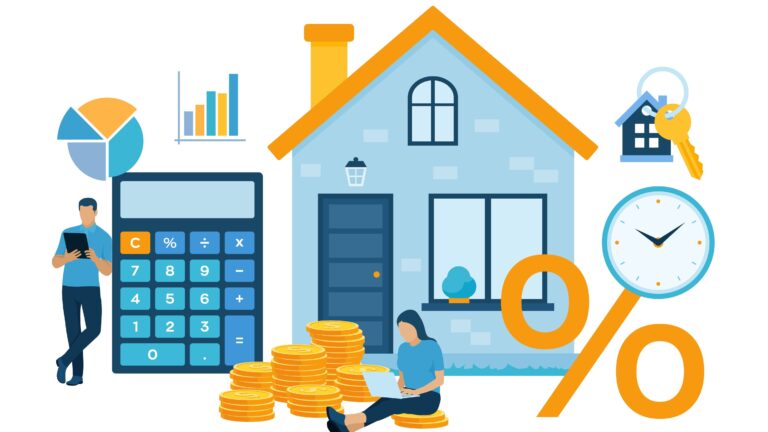
The disparity between low mortgage rates that homeowners have on their current home and the significantly higher one they could get on a new property is turning US homeownership into a type of escape room from which millions can’t get out.
Mortgage rates in mid-April jumped above 7 percent for the first time since November, a reminder of how they stubbornly remain elevated. Buyers were able to get 30-year fixed-rate mortgages below 3 percent as recently as 2021 — meaning rates have more than doubled in less than three years, according to Freddie Mac data.
Ninety-six percent of buyers in the United States have a fixed-rate mortgage — and 63 percent of that group has a mortgage rate under 4 percent, according to a March report by the Federal Housing Finance Agency. That means a large buyer bloc simply can’t afford to move because, by trading their existing mortgage for a new one at today’s higher rates, homeowners would end up spending roughly $500 more per month under current financing terms.
Ninety-two percent of Boston homeowners are experiencing mortgage “rate lock”; they are reluctant to give up their existing home and lower mortgage rate for a new property at today’s higher costs, according to Zillow data.
“It’s pretty hard to trade up today. You’re going to pay more for the house, and you’re going to pay much more for the mortgage,” said Elaine Bannigan, a broker with Douglas Elliman. “That’s a pretty hard pill to swallow for that trade-up market. That’s who gets hurt the most.”
South End resident Nancy Farrington has lived in her condo in a luxury, full-service building since 2021, when she was able to secure a 30-year fixed-rate mortgage at 2.5 percent. Farrington eventually plans to move back to her hometown of Charleston, S.C., but she has little faith that her condo will sell swiftly when it goes on the market this summer.
“These days, who is going to take on an 8 percent mortgage?” Farrington said. “I was fully in the camp of three rate cuts this year, but I’m not counting on any rate decreases and the Fed doing anything. That makes me very pessimistic, but then again, I’m a Catholic and a Red Sox fan, so I’m always pessimistic.”
Life changes take a back seat
A survey out last month from John Burns Research & Consulting polled prospective home buyers on what was holding them back from purchasing a home. Waiting for mortgage rates to decline was the top factor, eclipsing “waiting for a life stage change” as the No. 1 reason for the first time since the consulting firm began polling buyers in March 2023.
“Historically, the number one reason that households move is life change,” said Alex Thomas, a senior research analyst at John Burns. “I’ve heard people call it the four D’s: death, divorce, diamonds, and diapers. That’s generally why people move. It’s not always primarily financially motivated.”
Even mortgage rates hovering around the 7 percent mark are well below the north-of-18 percent figures seen in the 1980s, but buyers then were facing significantly lower home prices than today. Home prices broke records in March, according to the latest data from The Warren Group.
Mortgage “rate lock” has several trickle-down effects, according to the FHFA:
Beyond the 30-year fixed
But there are potential solutions and strategies for those willing to break from the mind-set that a 30-year fixed-rate mortgage is the only way to buy a home.
Today’s shoppers fall into three buckets, according to Bannigan: first-time, trade-up, and luxury buyers. Luxury buyers often can pay in cash. Trade-up buyers can afford to stay put because their purchase is often discretionary. First-time buyers are changing their strategy.
“They desperately want to buy, but they have had to readjust their expectations because they can afford less today than they would have at lower rates,” Bannigan said. “There’s such little inventory at their price points that these buyers have concluded that this is not their last house. Therefore, to make a plunge into the market, they recognize interest rates can’t stay this high forever.”
Mortgage rates may be volatile, but home prices are steadily rising. It’s better to get in today, even at a less-than-desirable mortgage rate, rather than wait on the sidelines for prices to creep even higher, the thinking goes.
These buyers are looking at different financing options, including adjustable-rate mortgages that can be refinanced at — it is hoped — a lower rate when things settle.
Relief won’t come overnight, but there are some signs of wiggle room to mortgage rate lock.
“Everybody was waiting for this moment for the rates to come down, which really never happened,” said Susan Bevilacqua, a Wellesley-based realtor with Douglas Elliman who has seen buyer activity pick up in recent months. “My sense is that people are just tired of waiting, and they’re doing what they need to do to make it work.”
Baby boomers who aren’t necessarily luxury home buyers — especially those in more affordable housing markets — also can be less vulnerable to rate lock because they’ve already built equity in their homes and paid off their mortgages. About 11 percent of baby boomer homeowners in the Boston metropolitan area are unaffected by rate lock, while nearly 38 of those in Pittsburgh are immune to it, according to Zillow.
“At the start of this year, we saw a big increase in new listings in our data,” said Orphe Divounguy, a senior economist at Zillow. “Our research shows that the increase in new listings was mostly pronounced in the kind of retirement community where you have a lot of baby boomers who are mortgage debt free.”
An increase in buying and selling in high-priced Wellesley and retirement communities around the United States might not be music to the ears of price-sensitive or younger buyers. But there is also an expectation that more affordable homes will eventually start to come back to the market as the broader buyer pool coalesces around a new normal. That likely won’t be a sub-3 percent mortgage rate. Rates might not come crashing down, but hopefully they won’t surge as quickly as they have in the past couple of years, either.
“If we see less volatility, that’s going to be a good thing for the housing market,” Divounguy said.
Send comments to camsperance@gmail.com. Subscribe to our newsletter on Boston.com/realestate and follow Address @globehomes.
Loading…





